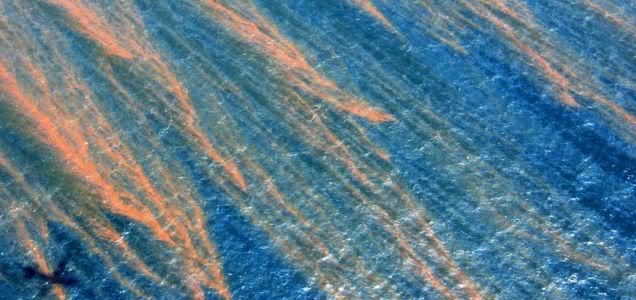Well (no pun intended), BP managed to shove something up their greasy hole today (pun very specifically intended). This is something many have suggested that they should do since the burning and sinking of the Deepwater Horizon on April 20. The leak has not stopped, but at the moment some oil is being collected by a ship located above the site of the wreckage. There is no word that this effort will contain all of the leak until new wells are drilled this summer, but something is better than nothing.
The official line is that the leak had been running at 5,000 barrels (200,000 gallons) per day, though estimates by outside sources put it at up to 70,000 barrels (2,800,000 gallons) per day. To date, therefore, the accident has released between 5,200,000 gallons (half of the Exxon Valdez spill) to 72,800,000 million gallons (seven times the Exxon Valdez) into the Gulf of Mexico.

While the oil on the surface to date seems to match the lower release number, BP has been injecting dispersants into the stream of oil flowing from the ruptured well, causing the oil to stay below the surface creating oil plumes deep beneath the sea. One such plume has been measured as being ten miles long, three miles wide and 100 meters (330 feet) thick.
In one estimate, of one plume, it is thought that there is a 10-mile long by 3-mile wide plume leading away from the oil well.
While the density of these plumes is unknown (BP will not allow anyone else to get near the source of the leak), this single plume would contain 1,851,428,571,448 gallons of contaminated liquid (yes, that’s about two trillion).
That’s one plume.
The plumes are being eaten by microbes that consume the oil – which is good. The microbes consume oxygen while doing their task – which is bad. So far, these plumes have lowered the oxygen levels in surrounding waters by a third, explaining all the dead fish washing ashore where Gulf residents are waiting for the oil that will follow one way or another. The Dead Zones in the Gulf created by this process will therefore add another layer of consequence to what now appears to be clear negligence on the part of BP and the regulatory agencies responsible for preventing this sort of thing.
Some have attempted to brush off the whole thing by referring to the Ixtoc I oil spill – the largest accidental and ocean-based oil spill in history – which dumped over 130,000,000 gallons of oil into the Bay of Campeche for nine months in 1979 and 1980. If that didn’t kill everything in the Gulf, certainly this will be OK, too. There are a couple problems with that theory:
o The Ixtoc I was in 150 feet of water close to shore off the Yucatan Peninsula.
o The oil from the Ixtoc I spill all floated to the surface, where according to Mexican officials a third burned off, a third evaporated and the rest that didn’t end up coating beaches degraded at sea. The use of deepwater dispersants is keeping most of the Deepwater Horizon oil underwater where it is neither burning off nor evaporating.
o The Ixtoc I was not located near the breeding grounds of the northern Gulf, and it occurred on June 3 in 1979, after peak breeding season.
As this cartoon of a disaster Laurel-and-Hardy’s it’s way further into reality – as America’s ability to produce the fuel it needs decreases faster due to corporate incompetence and government carelessness than any foreign enemy could possibly hope to manage themselves – the country becomes uncomfortably less able to ignore the possible impact every day.
We all hold our breaths hoping that somehow this won’t be as bad as we think it might be. I somehow hope that something will make this better than it looks. But it gets harder to hold that belief with each passing moment. One thing seems certain, when we moved last year from our home on Siesta Key – a barrier island off Florida’s Sarasota Gulf coast – we made a surprisingly foresighted decision.
Consider this an extremely slippery Open Thread to cling to.
13 comments